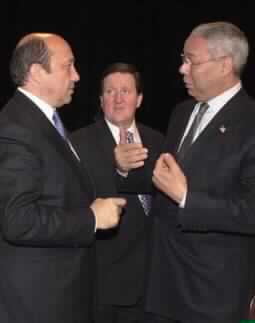HIGHLIGHTS: A NATO-Russia Council on Counter-terrorism Meets Outside Rome, May, 28, 2002||2nd Russian Friendship Gesture in a Week Towards Former Enemies||Prague NATO Summit in November to Discuss Expansion Eastwards & Modernization||STORY: Heralding the Cold War's funeral, NATO and Russia reached a historic agreement Tuesday to combat common security threats in the post-Sept. 11 era. The deal establishing a NATO-Russia council to set policy on counter-terrorism and a range of other issues was reached by Secretary of State Colin Powell and other NATO foreign ministers after meeting in the Icelandic capital with their Russian counterpart. (Read photo caption)
NATO will inaugurate one of the most significant changes since the fall of communism on May 28 when President Bush joins other NATO leaders and Putin outside Rome for the first meeting of the new Russian-NATO council.
"This is the last rites, the funeral of the Cold War," said British Foreign Secretary Jack Straw. "Fifteen years ago, Russia was the enemy, now Russia becomes our friend and ally. There could be no bigger change."
NATO Secretary-General George Robertson said the terror attacks in the United States had driven home the need for broad international cooperation to defend common values and interests, which now extend to Russia.
The NATO-Russia pact, which arose from Russian President Vladimir Putin's support for the West since the Sept. 11 terror attacks, was the second significant step Russia has taken this week toward its former enemies. On Monday, Moscow and Washington agreed to reduce their nuclear arsenals by two-thirds.
"We not only can, but we are obliged to act as partners in the face of this new threat," Russian Foreign Minister Igor Ivanov said.
The new NATO-Russia Council will set joint policy on a fixed range of issues including counter-terrorism, controlling the spread of nuclear, chemical and biological weapons, missile defense, peacekeeping and management of regional crises, civil defense, search-and-rescue at sea, promoting military cooperation and arms control.
Straw emphasized the cooperation was more than symbolic: "It could make an enormous difference in the war on terrorism."
NATO officials say the agreement will not affect the alliance's core mutual defense role and that safeguards are built in to ensure Moscow will not be able to veto NATO decisions if relations sour.
The foreign ministers also adopted what Robertson called "the agenda of change." Buoyed by prospects for a new U.S.-Russia weapons treaty, the ministers uniformly described an atmosphere of goodwill and consensus on the first day of meetings.
Capping an ambitious reform agenda to prepare for a summit in Prague in November, the ministers reviewed the alliance's plans to invite new members from eastern Europe, agreed to modernize NATO's military capabilities to respond to evolving threats and establish new relations with Ukraine and other former Soviet republics.
PHOTO CAPTION
U.S. Secretary of State Colin Powell, right, shares a word with Russia's Foreign Minister Igor Ivanov, left, as NATO Secretary General Lord Robertson looks on during the NATO-Russia Permanent Joint Council meeting in Reykjavik, Tuesday May 14, 2002. NATO on Tuesday aims to strike its own landmark agreement with Russia on Tuesday and take cooperation with Moscow to a new level. (AP Photo/Virginia Mayo)
- Author:
& News Agencies - Section:
WORLD HEADLINES


 Home
Home Discover Islam
Discover Islam Quran Recitations
Quran Recitations Lectures
Lectures
 Fatwa
Fatwa Articles
Articles Fiqh
Fiqh E-Books
E-Books Boys & Girls
Boys & Girls  Ramadan
Ramadan Fatwa Audios
Fatwa Audios Month of Mercy
Month of Mercy Women
Women Eed Al- Fitr
Eed Al- Fitr Food Recipes
Food Recipes Videos
Videos

 Prayer Times
Prayer Times












